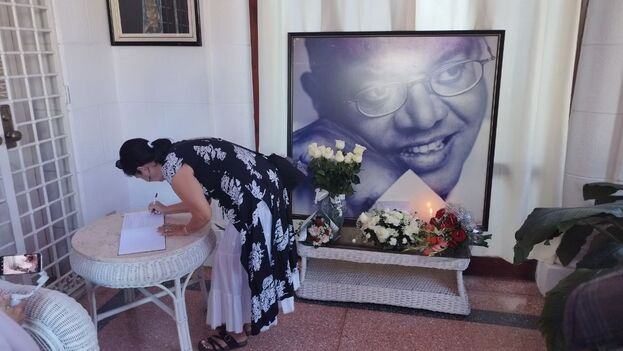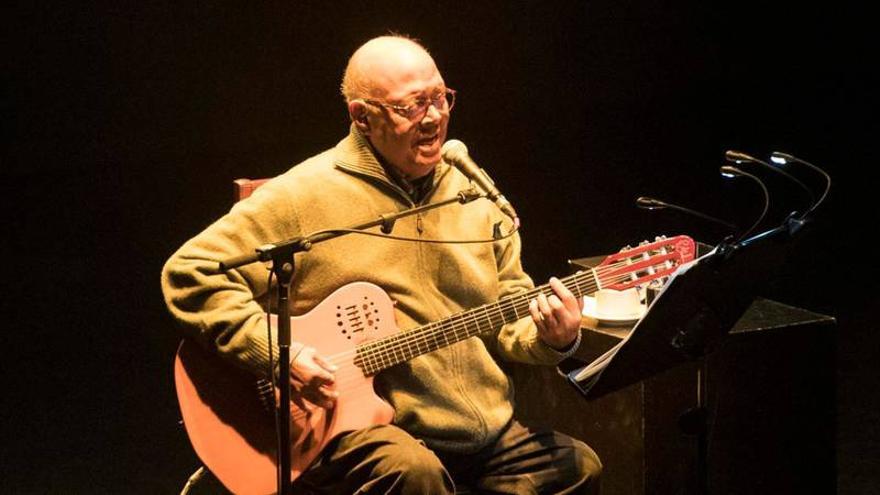
![]() 14ymedio, Havana, 21 November 2022 — Cuban singer/songwriter Pablo Milanés died in Madrid on Tuesday at the age of 77. His death was confirmed by sources close to the artist. Milanés had been hospitalized for several weeks with an inflamed gallbladder and a kidney infection, which had forced him to cancel several concerts.
14ymedio, Havana, 21 November 2022 — Cuban singer/songwriter Pablo Milanés died in Madrid on Tuesday at the age of 77. His death was confirmed by sources close to the artist. Milanés had been hospitalized for several weeks with an inflamed gallbladder and a kidney infection, which had forced him to cancel several concerts.
Milanés moved to Spain five years ago to seek treatment for myelodysplastic syndrome, a type of cancer that decreases a person’s immune response. Asked by 14ymedio about his medical condition, a family source said he was “stable” and was expected to improve, though his medical condition remained serious.
Milanés was born in Bayamo, a town in the province formerly known as Oriente, on February 24, 1943. His musical career began early when he appeared on a local radio show at the age of six.
His family moved to Havana shortly thereafter, thrusting the young Milanés into the capital’s diverse musical environment. There, he was influenced not only by the then-popular filin and traditional musical genres but also by American and Brazilian rhythms as well as the work of classical composers.
He became more widely known after an appearance in 1956 on the Cuban TV program Estrellas Nacientes (Rising Stars). In the decade following the 1959 Cuban Revolution, he worked with musical groups such as Los Armónicos and Sensation, and often appeared in nightclubs such as El Gato Tuerto (The One-Eyed Cat) and Saint John.
The most recognizable characteristics that came to define his work — poetically beautiful lyrics set to music — are already evident in the first two songs he composed: “Tú, mi desengaño” (“You, My Disillusion”) from 1963, and “Mis veintidós años” (“My Twenty-Two Years”) from 1965. Though he expressed support for Fidel Castro during this period, it did not prevent him from being sent to a forced labor camp, known as a Military Units to Aid Production (UMAP), along with other “undesirables” such as artists, intellectuals, priests and homosexuals.
In 1969 he joined Grupo de Experimentación Sonora, a musical group affiliated with the Cuban Institute of Cinematographic Art and Industry, under the direction of Leo Brower. Its work served as the soundtrack for numerous Cuban films of the era and even, to some extent, for the Communist Revolution itself.
During this period, he worked alongside other Grupo members who became the era’s most prominent mucisicians and critics, including Noel Nicola, Sergio Vitier, Eduardo Ramos, Leonardo Acosta. Along with musicians Silvio Rodriguez, Sara Gonzalez and Amaury Perez, he also became one of the leading figures the nueva trova movement.
It was during this period that he composed “Yolanda,” one of his most iconic songs, as well “Quien me tienda la mano al pasar” (“Who Holds My Hand as I Pass”) and “Los caminos” (“The Paths”). In 1975 he recorded an album, Versos sencillos (Simple Verses), a musicalization of the poems of Jose Martí. By then, Grupo had been disbanded and its members had launched solo careers.

He performed in Europe and Soviet-bloc countries as well as in Mexico and elsewhere in Latin America. In 1985 he recorded the album Querido Pablo (Dear Pablo), a collaboration with two other singer/songwriters, Argentina’s Mercedes Sosa and Brazil’s Chico Buarque.
During a decade of political tension, and shortly before the fall of the Soviet Union, he starred in the 1987 TV program Proposiciones and organized the successful concert tour “Amo esta Isla” (“I Love This Island”), whose last performance foreshadowed the Special Period. In the years following, he recorded the albums Identitdad, (Identity) Canto de abuela, (Grandmother’s Songs), Origenes (Origins) and Despartar (Waking Up)
Milanés was considered one of the most important Latin American artists and had numerous projects in Cuba and abroad. His death coincides with the recent release of his album Días de luz (Days of Light).
Milanés strongly condemned the government crackdown following demonstrations in Cuba on July 11, 2021. “I believe young people, who with the help of all Cubans, must and will be the engine of change,” he said. He also described as “irresponsible and absurd” the use of repression by the Cuban government against the people, whom he said “have sacrificed and given everything for decades to sustain a regime that, in the end, imprisons them.”
Milanés was also one of the artists who publicly supported the Civic March for Change on November 15, 2021. “It is beautiful that we just so happen to express our demand for absolute freedoms through flowers,” he wrote in a message of support to protestors.
His last concert in Havana, which took place in June 2022, took place under a heavy police presence. The emotional audience listened as Milanés sang songs such as “Años (“Years”) “El pecado original” (“Original Sin”), “La soledad” (“Loneliness”), “Nostalgias” (“Nostalgia”) and “Días de gloria” (“Glory Days”). It was the first time any of them had heard him perform live for several years.
____________
COLLABORATE WITH OUR WORK: The 14ymedio team is committed to practicing serious journalism that reflects Cuba’s reality in all its depth. Thank you for joining us on this long journey. We invite you to continue supporting us by becoming a member of 14ymedio now. Together we can continue transforming journalism in Cuba.
